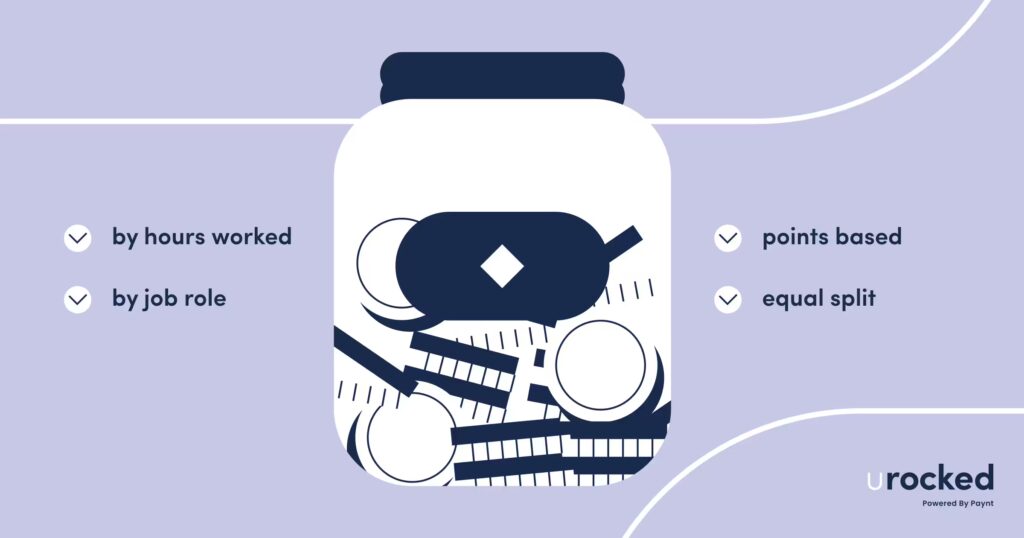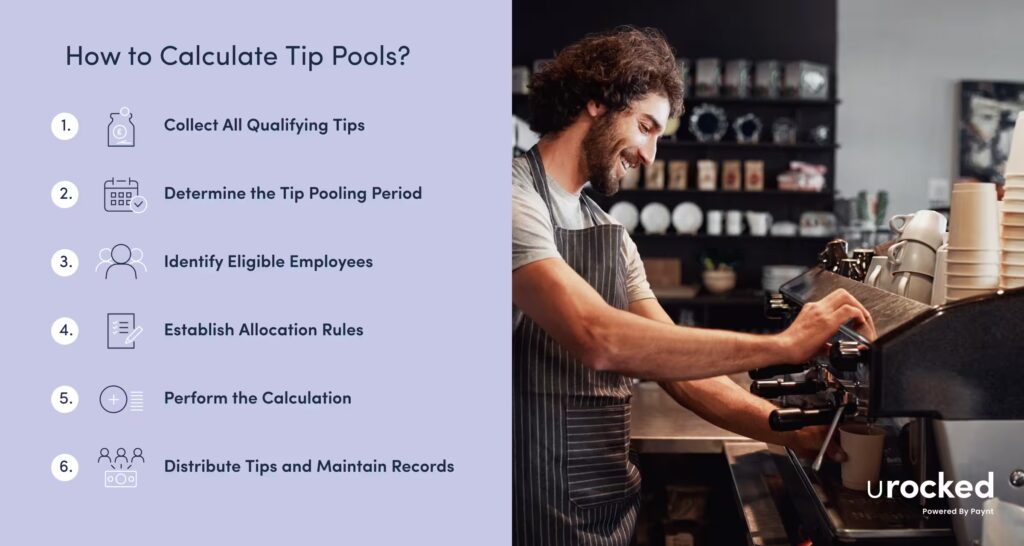

Tip pooling is a practice where all tips earned by employees are combined into one collective pool and then redistributed among eligible staff members. Tip pooling is popular in hospitality workplaces by creating predictable earnings, encouraging cooperation, and reducing pay disputes.
The law on tip pooling requires employers to distribute 100% of qualifying tips to workers fairly and transparently. In the UK the law on tips and service charge is the Employment (Allocation of Tips) Act 2023.
Tip pooling collects all qualifying tips into a shared pool and distributes them fairly using formulas based on hours worked, point systems, or employee roles. To implement tip pooling in a business, steps include establishing a legally compliant system, writing a clear policy, and distributing tips using transparent rules. Businesses can adopt tip pooling software to save time on collecting and managing tip distribution and payouts.
Tip pooling, also referred to as tip sharing or tip splitting, is a practice where all tips earned by employees are combined into one collective pool and then redistributed among eligible staff members. Tip pooling ensures all eligible employees including back-of-house staff who contribute to customer experience benefit from tips and not just those who directly receive tips. In this system, employees contribute the tips earned during their shift into one large pot to be distributed fairly according to a businesses tip policy. This approach ensures a more equitable distribution of tips for staff who receive fewer tips based on their job roles. Tip pooling redistributes pooled tips among eligible staff members according to hours worked, a point based system or job roles.
Tip pooling provides substantial benefits for employees and employers within the hospitality sector. Employees experience more predictable earnings and reduced income disparities between roles if establishments implement proper tip pooling systems. Enhanced workplace cooperation improves overall service quality. Employers benefit from reduced disputes over tip distribution and improved staff morale.
Point-of-Sale systems and dedicated tip management software enable efficient tip pooling operations. These systems maintain detailed transaction records and ensure transparent allocation according to predetermined formulas. Technological solutions such as tip pooling software streamline the collection of cash and card tips.

Tip pooling software is a technological solution that automates the management and distribution of gratuities amongst employees. This software eliminates manual processes for collecting, calculating, and allocating tips. Tip pooling software automatically calculates complex tip pooling rules owed to staff. This software ensures businesses comply with UK legal requirements on tipping under the Employment (Allocation of Tips) Act 2023. Tip pooling software transforms complex tip management into an easy-to-use streamlined, transparent, and compliant process for management.
Tip pooling software typically integrates with point-of-sale systems, card machines and mobile applications such as URocked’s cashless tipping software and Paynt Tipping to capture tip data in real-time. Advanced calculation engines apply customisable distribution algorithms that account for hours worked, role responsibilities, and performance metrics. These platforms support multiple distribution models such as points-based systems, hourly splits, and percentage allocations.
UK hospitality businesses gain substantial benefits including time savings through automated calculations, reduced administrative errors, and enhanced regulatory compliance. Employers experience decreased disputes over tip distribution, streamlined payroll integration, and robust reporting for annual tax reports. Employees gain clear visibility of tip earnings through user-friendly dashboards, accurate payouts, and confidence in fair distribution.
The law on tip pooling requires employers to distribute 100% of qualifying tips to workers fairly and transparently. In the UK the law on tips and service charge is the Employment (Allocation of Tips) Act 2023. This Act came into full effect on 1 October 2024. The legislation establishes the primary legal framework for tip distribution in hospitality businesses. Employers must pass all qualifying tips from tip pools to workers without deductions. Statutory deductions such as tax and National Insurance are permitted exceptions. Qualifying tips include electronic tips, service charges, and cash tips under employer control.
The Employment (Allocation of Tips) Act 2023 prohibits employers from retaining any portion of pooled gratuities. Employers cannot pool tips across multiple locations and branches. This ensures tips and service charges generated at one location are only distributed to the staff that helped generate tips and not with other staff in an organisation.
Under the Act fair distribution does not mean equal distribution. The statutory Code of Practice provides guidance considering factors such as job role, hours worked, and customer intent. Employers are required to maintain a written tipping policy accessible to all workers and customers detailing how tips are collected, allocated, and distributed.
Record keeping requirements mandate employers maintain accurate records of all tips received and their allocation for at least 3 years. Tips are paid to workers no later than the end of the month following the month in which the employer received them.
The legislation prevents employers from retaining tips and making deductions for business costs such as card processing fees. Existing tronc schemes remain valid within this framework where a troncmaster manages distribution. Under the Act employers are responsible for compliance when using a tronc system.
Tip pooling works by collecting all qualifying tips from customers into a central pool and distributing them fairly amongst employees according to a predetermined formula such as hours worked, points based or role based splitting. The process begins when businesses gather both shared cash tips and non-cash tips such as card payments, contactless transactions, and app-based gratuities from customers.
These tips are classified as “qualifying tips” under UK law as they come under employer control. All collected tips are combined into a single central fund that remains separate from the business’s revenue and operating expenses. The allocation process uses various distribution methods that businesses establish based on their operational structure and workforce needs.
Points systems assign employees points based on factors such as role, seniority, or performance. The tip pool is divided proportionally according to total points earned. Points-based systems apply weighted calculations based on roles, or performance metrics. Hours-worked basis distributes tips proportionally to the hours an employee worked. Role-specific percentages allocate different percentages to various departments such as front-of-house, back-of-house, and management positions.
In tip pooling systems, employees are typically provided with a detailed report on the total amount of qualifying tips attributed to the business and the amount allocated to them based on the tip policy.
Tip pooling software works by automatically capturing tip data, calculating individual employee shares and distributing tips based on predefined rules. This software typically automates tip distribution based on hours worked, job roles or points based methods, ensuring fairness and compliance with tipping regulations.
The process begins by capturing data through integration with POS systems, payment terminals, and online ordering platforms. Tip pooling software automatically captures all tip types in real time, including card payments, digital tips, and manually declared cash tips in real-time. APIs integrate tip pooling software with existing business systems. Cloud-based platforms ensure accessibility and data security throughout the process.
The software typically supports allocation methods such as points-based systems, hours-worked, and role-specific percentages.
Automated algorithms apply tip distribution rules and create a tip allocation for each entitled employee over a specific period where tips are received.
Payout mechanisms transfer the payment of tips to employees through multiple integrated channels. Integration with payroll systems includes tips together with regular wage payments. Direct bank transfers enable instant or scheduled payouts, reducing reliance on cash handling.

To calculate tip pools for a restaurant follow the six steps below:
Step 1: Collect All Qualifying Tips
Aggregate all tips received from customers through cash, card payments, and digital tipping apps. Card payments include service charges on bills. Under UK law, service charges are to be treated as “qualifying tips” and are passed on to staff without deductions. Record all tip and service charge amounts accurately during the collection period.
Step 2: Determine the Tip Pooling Period
Establish a defined period for tip pooling and calculation such as a shift, day, week, or pay period. Document the chosen period in your restaurant’s written tipping policy.
Step 3: Identify Eligible Employees
Determine which employees are eligible to receive a share of the tip pool based on your restaurant’s tipping policy. Include all staff who contribute to the customer experience to ensure fair distribution.
Step 4: Establish Allocation Rules
Implement a fair and transparent method for distributing the pooled tips that is clearly communicated to all staff. Common allocation methods used in UK restaurants include hours worked, points systems, and percentage-based allocation.
Step 5: Perform the Calculation
Execute the calculation using your chosen allocation method. Double-check all calculations to ensure correct distribution amounts for each eligible employee.
Step 6: Distribute Tips and Maintain Records
Pay out the calculated tip amounts to employees no later than the end of the month following the month in which the tips were received. Maintain detailed records of all tips received and their distribution for at least 3 years. Provide employees access to these records upon request to ensure transparency and legal compliance.
Yes, kitchen staff can receive tips through tip pooling arrangements in UK restaurants. Kitchen staff are eligible to receive a share of pooled tips as they contribute to the overall customer experience. Employers should distribute tips fairly and transparently amongst all eligible workers, which includes both front-of-house and back-of-house employees in accordance with the Code of Practice on fair and transparent distribution of tips.
To implement tip pooling in your business, you establish a legally compliant system, create a written policy, choose a management system, establish a tip collection process, implement the method and distribute tips according to transparent rules. The seven steps in implementing tip pooling in your business are listed below:
Step 1: Understand UK Legal Requirements
Understand the Employment (Allocation of Tips) Act 2023. The core requirement mandates passing on 100% of qualifying tips to workers without deductions. Distribute tips fairly and transparently and maintain detailed records for at least 3 years.
Step 2: Develop a Fair and Transparent Tipping Policy
Draft a clear, written tipping policy that outlines how tips are collected, pooled, and distributed. This policy specifies the chosen allocation method such as points systems, hours worked, or role-based percentages. Define the frequency of distribution and identify who is eligible to receive tips. Make the policy accessible to all employees.
Step 3: Appoint a System for Tip Management
Decide how tips are managed through one of 3 approaches; manual systems, designated individuals, or software solutions. Manual systems work for very small businesses if regulatory complexity is manageable. Designated individuals such as a “troncmaster” act as independent persons responsible for allocating tips. Choose tip pooling software for the most efficient and compliant method for most businesses through automated processes.
Step 4: Establish a Tip Collection Process
Create a system for collecting all tips, both cash and non-cash including card and app-based payments, into a single secure fund. Ensure accurate recording occurs at the point of collection.
Step 5: Implement the Chosen Allocation Method
Apply the pre-defined allocation rules from the tipping policy to the total pooled tips. Calculate distributions using the chosen method. Double-check all calculations before distribution.
Step 6: Distribute Tips and Maintain Records
Pay out calculated tip amounts to employees no later than the end of the month following the month in which the tips. Maintain accurate records of all tips received, their allocation, and distribution for 3 years. Make these records accessible to employees upon request. Include payment dates, amounts, and recipient details in documentation.
Step 7: Communicate and Train Staff
Communicate clearly with all staff about the new or revised tip pooling system.
Software that can help with tip pooling includes URocked’s tipping platform and POS-integrated tipping modules that automate tip collection, calculation, and distribution processes. URocked’s cashless tipping software integrates with existing Point of Sale (POS) systems to capture all qualifying tips automatically. The platform applies customisable allocation rules and ensures compliance with the Employment (Allocation of Tips) Act 2023. URocked provides real-time tip tracking, transparent reporting, and automated payouts to employees.
URocked’s tipping platform offers comprehensive features for UK businesses including secure tip collection from multiple payment sources. The software supports flexible distribution methods such as points-based systems and hours-worked calculations. The platform maintains detailed audit trails for HMRC compliance. The software maintains accurate records for at least 3 years as required by law.
The software provides employee access to tip statements and generates comprehensive reports for management oversight whilst providing timely tip payouts for staff.
The best tip pooling software for private clubs is URocked’s tip pooling software because it handles member-specific tipping, integrates with club management systems, and is easy to use dashboards for management and staff. Private clubs require sophisticated tip pooling solutions that have the ability for customers to pay for service charge and tips within a single transaction. Private clubs need to accommodate a large number of staff and apply pre-determined allocation rules for all eligible staff contributing to customer experience.
URocked’s platform addresses these unique requirements through customised allocation rules and easy to use management dashboard and tipping app for staff.
URocked’s software excels for private clubs by supporting complex tipping structures such as member gratuities, event-specific tips, and departmental allocations across dining and hospitality services. The tipping software provides detailed reporting for club management whilst maintaining member privacy and confidentiality standards because private clubs prioritise discretion.
The software handles both automatic service charges and discretionary tips from members. It ensures compliance with the Employment (Allocation of Tips) Act 2023 whilst accommodating the unique operational needs of exclusive membership organisations.